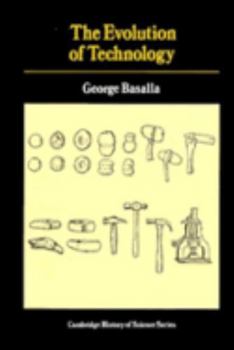The Evolution of Technology
(Part of the Cambridge Studies in the History of Science Series)
Select Format
Select Condition 
Book Overview
Presents an evolutionary theory of technological change based on recent scholarship in the history of technology and on relevant material drawn from economic history and anthropology. Challenges the popular notion that technological advances arise from the efforts of a few heroic individuals who produce a series of revolutionary inventions that owe little or nothing to the technological past. Therefore, the book's argument is shaped by analogies drawn...
Format:Paperback
Language:English
ISBN:0521296811
ISBN13:9780521296816
Release Date:October 2010
Publisher:Cambridge University Press
Length:260 Pages
Weight:0.82 lbs.
Dimensions:0.7" x 6.7" x 8.5"
Customer Reviews
3 ratings
How does technology evolve over time?
Published by Thriftbooks.com User , 16 years ago
Fascinating study on the evolution of technology from a variation and selection perspective. The book is written by a historian, but unusually for a historian the book is driven by a strong theoretical perspective. The author uses the example of barbed wire, but he does not just report a lot of historical details. He also places those details in perspective by using an evoluationary model of technical change. That makes this author 100 times more interesting than had the author that just gives us historical facts.
Do Technologies 'Evolve'?
Published by Thriftbooks.com User , 17 years ago
Basalla's 'Evolution of Technology' makes the analogy to biological evolution to explain the development of technologies: the Paleolithic chipping stone becomes the crude stone-and-wood hammer which later becomes a cast-iron hammer which eventually becomes the giant mechanical steam hammer. Of course, thinking of technology in such evolutionary terms can ONLY be analogical--tools don't have genes, and they certainly don't procreate. What tools and technologies have is diversity (a key component in evolutionary change); however, it takes human needs--necessities--to bring about technological developments. This historical combination of technological diversity and human necessity is "evolution" for Basalla. Basalla's argument is therefore a practical method for thinking about the history of technology--one of a number of different methods (for other alternatives see anything by Arnold Pacey, or the 'Short History of Technology' by Derry and Williams). And in this respect Basalla offers a fine approach. In fact, his book may well be the most readable history of technological progress available, but it is also one that places more weight on a single analogy than the analogy itself may be able to bear.
continuous improvements
Published by Thriftbooks.com User , 19 years ago
In considering the role of major inventions in history, there have been two major views. This book puts forward one of them. Namely that technological progress can be understood in part by analogy to biological evolution, as a series of continuous and incremental innovations, that arise out of the gestalt of the inventor's environment. The authors argue eloquently, with much cited research to buttress their arguments. Certainly, most inventions are indeed incremental gains in understanding. But one might say that if you take the evolution analogy, there is also a corresponding hypothesis akin to punctuated equilibrium. Namely that sometimes, an inventor or scientist really does make a fundamental discontinuity in understanding. In a way that a continuously innovative procedure would have been extremely unlikely to garner. In science at least, the best examples may be Einstein's General Relativity, and Claude Shannon's Information Theory. Nothing like either was even remotely contemplated by their contemporaries. Ok, granted, the book talks about technology, not science. But at some fundamental level, the discussion of progress encompasses both.






